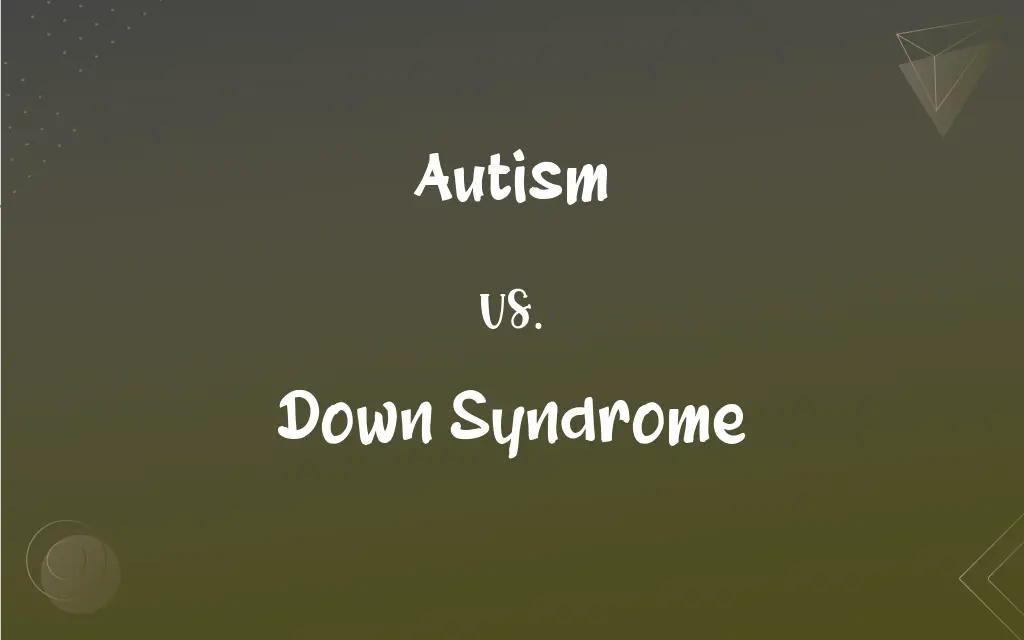Autism vs. Down Syndrome: What's the Difference?
Edited by Janet White || By Harlon Moss || Updated on October 27, 2023
Autism is a neurodevelopmental disorder affecting communication and behavior; Down syndrome is a genetic disorder caused by an extra 21st chromosome.

Key Differences
Autism, a complex neurodevelopmental disorder, affects social interaction and communication, often exhibiting repetitive behaviors and restricted interests. Down syndrome, on the other hand, is a genetic condition resulting from an extra copy of chromosome 21, leading to distinctive physical features and intellectual challenges.
Autism's causes remain under study, but it's believed to involve genetic and environmental factors. Down syndrome, however, specifically arises from a triplication of chromosome 21.
Diagnoses for autism primarily depend on behavioral observations and developmental history. Down syndrome, in contrast, is usually identified at birth or prenatally through genetic testing due to characteristic physical features.
Autism spectrum disorder (ASD) encompasses a range of symptoms, and individuals can exhibit varying degrees of severity. Down syndrome individuals also exhibit a range of abilities, but the condition is consistently characterized by certain physical and cognitive features.
While both autism and Down syndrome affect cognitive and developmental aspects, it's possible for someone with Down syndrome to also have autism, although the two are distinct conditions.
ADVERTISEMENT
Comparison Chart
Origin
Neurodevelopmental disorder
Genetic disorder (extra chromosome 21)
Diagnosis Method
Behavioral observations and developmental history
Genetic testing, physical characteristics
Primary Manifestations
Impaired social interaction, communication; repetitive behaviors
Distinctive physical features, intellectual challenges
Associated Conditions
ADHD, anxiety, epilepsy
Heart defects, hearing loss, vision problems
Cause Understanding
Combination of genetic and environmental factors
Triplication of chromosome 21
ADVERTISEMENT
Autism and Down Syndrome Definitions
Autism
Autism manifests in diverse ways across the spectrum.
No two individuals with autism experience it exactly the same way.
Down Syndrome
Down syndrome leads to cognitive and developmental delays.
Early intervention programs benefit kids with Down syndrome in their development.
Autism
Autism is a neurodevelopmental condition affecting social interaction.
Many children with autism find crowded places overwhelming.
Down Syndrome
Down syndrome is a genetic condition with an extra 21st chromosome.
Children with Down syndrome often have distinct facial features.
Autism
Autism often involves communication challenges.
He communicates non-verbally due to his autism.
Down Syndrome
Down syndrome can come with certain health challenges.
Many babies with Down syndrome require heart surgery early in life.
Autism
Autism impacts each individual differently, with varied levels of severity.
Despite his autism, he has an incredible talent for music.
Down Syndrome
Down syndrome individuals exhibit a range of abilities.
Her Down syndrome doesn't stop her from pursuing her passion for dancing.
Autism
Autism can be associated with repetitive behaviors.
Her autism causes her to repeat certain actions for comfort.
Down Syndrome
Down syndrome affects physical growth patterns.
Due to Down syndrome, he had a slower growth rate than his peers.
Autism
Autism spectrum disorder, especially a more severe form of the disorder characterized by significant impairments in social interaction and communication, highly repetitive behavior, and strong resistance to change.
FAQs
What is Down syndrome?
Down syndrome is a genetic condition caused by an extra 21st chromosome.
Is Down syndrome diagnosed at birth?
Often, due to characteristic physical features, but also through genetic testing.
Is there a cure for autism?
No cure, but interventions can support individuals with autism.
Are there medications for autism?
Some medications can manage associated symptoms, but no drug treats autism's core symptoms.
What is autism?
Autism is a neurodevelopmental disorder affecting communication, behavior, and social interaction.
Is autism more common in boys or girls?
It's more commonly diagnosed in boys, but girls can be underdiagnosed.
How is autism diagnosed?
Through behavioral observations and developmental history.
Are there therapies for autism?
Yes, including behavioral, occupational, and speech therapies.
How prevalent is autism?
Rates have been increasing, but reasons vary from increased awareness to diagnostic criteria changes.
How do you support someone with Down syndrome?
Early intervention, education, therapies, and community support can be beneficial.
Can an individual have both autism and Down syndrome?
Yes, an individual with Down syndrome can also have autism.
What causes Down syndrome?
An extra copy of chromosome 21.
Do all individuals with Down syndrome have intellectual disabilities?
Most have mild to moderate intellectual challenges, but it varies.
Can diet changes help manage autism symptoms?
Some claim benefits, but evidence is inconclusive.
Are vaccines linked to autism?
No, scientific evidence has debunked this myth.
Can Down syndrome be detected prenatally?
Yes, through specific prenatal tests.
Are there varying degrees of autism?
Yes, it's a spectrum disorder with a range of severities.
What are common health issues associated with Down syndrome?
Heart defects, vision problems, hearing loss, among others.
Is Down syndrome hereditary?
It can be, but most cases are random events during cell division.
Can individuals with Down syndrome lead independent lives?
With support, many can lead semi-independent to independent lives.
About Author
Written by
Harlon MossHarlon is a seasoned quality moderator and accomplished content writer for Difference Wiki. An alumnus of the prestigious University of California, he earned his degree in Computer Science. Leveraging his academic background, Harlon brings a meticulous and informed perspective to his work, ensuring content accuracy and excellence.
Edited by
Janet WhiteJanet White has been an esteemed writer and blogger for Difference Wiki. Holding a Master's degree in Science and Medical Journalism from the prestigious Boston University, she has consistently demonstrated her expertise and passion for her field. When she's not immersed in her work, Janet relishes her time exercising, delving into a good book, and cherishing moments with friends and family.






































































